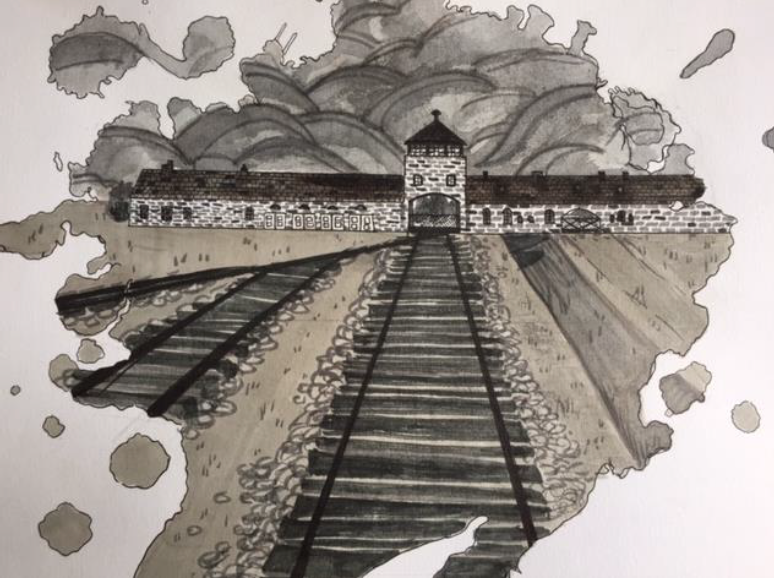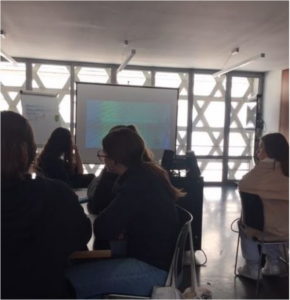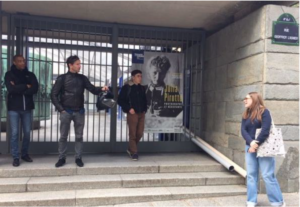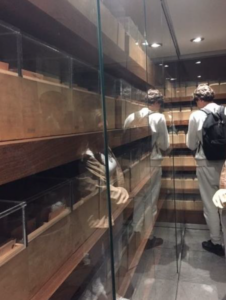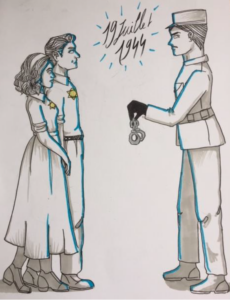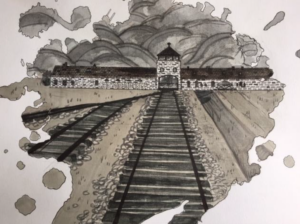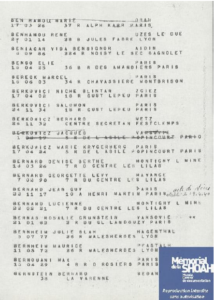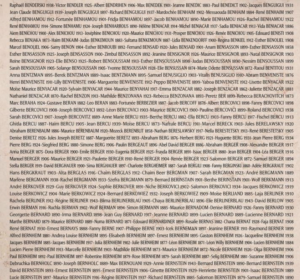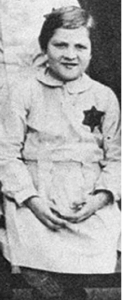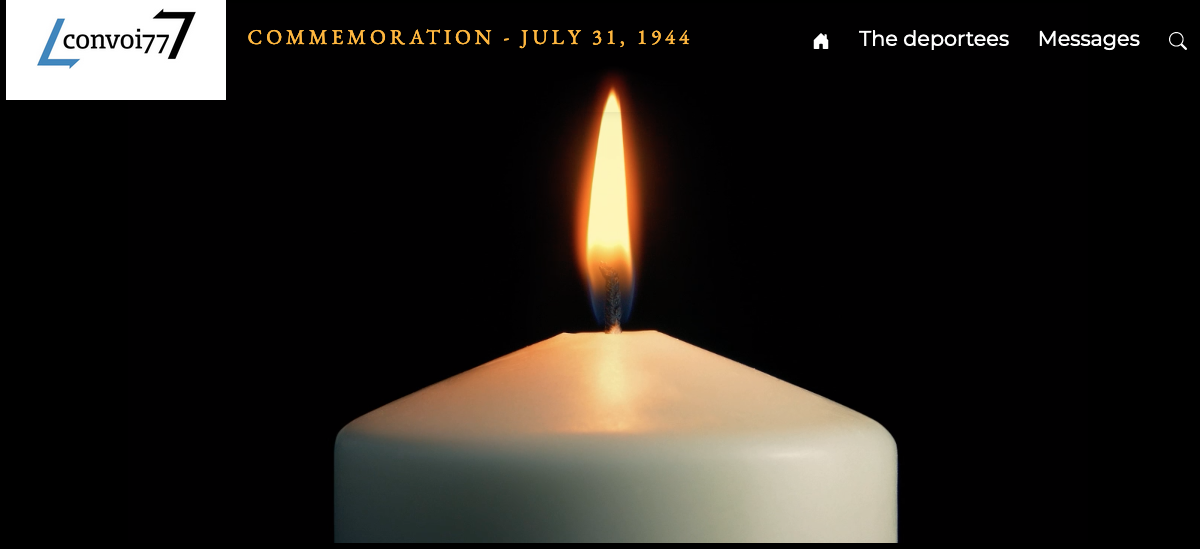Jacques BERCOWICZ
Our approach to the project
In November 2022, we introduced our 12th grade History, Geography, Geopolitics & Political science students to the idea of writing the biographies of a couple who were deported during the Second World War: Marie and Jacques Berkowicz. The majority of the students were enthusiastic about the project, so we promptly organized an initial methodological session to familiarize them (around ten students for each deported person) with the work involved in analyzing historical records. The first phase of our research began in January. Due to the new timetable for the French baccalaureate exams, and given that the project involves students in their final year of high school, the time allocated for the research was very limited. We began with records from the French Defense Historical Service in Caen, in Normandy, where the DAVCC (Division archives des victimes des conflits contemporains, or Victims of Contemporary Conflicts Archives Division) holds archives on civilian victims of both the First and Second World Wars. The contents of the file relate only to the post-war period, and include extracts from Jacques’ request for compensation file. These documents enabled his claim to succeed, but are highly repetitive and contain little information about the period before the German occupation, or about the “deportation” process. As a result, we had to “start at the end” of his story.
Once we had all finished the mock exams for our specialist subjects, we resumed work on the project. At this point, we decided to broaden our research to cover the whole sequence of events. We therefore contacted the Shoah Memorial in Paris. Claire Stanislawski, a documentalist in the Shoah Memorial archives department, agreed to meet with us. We went to meet her on May 16, 2023. The meeting was very interesting and rewarding, and we were able to access documents relating to the years 1940-1944. Firstly, there were the individual census forms compiled by the Seine prefecture in 1940. They include information on Jacques’ and Marie’s identities and occupations and also the dates on which they were arrested and deported. The personal check sheets produced by the Seine prefecture in 1941 and the Drancy camp internment records also added to our collection. We thus gained an insight into the key period in Jacques’ and Marie’s lives: their occupations and the dates on which they were arrested and deported. Ms. Stanislawski advised us to contact the French National Archives service to ask for information about Jacques and Marie’s request for French citizenship and the possible confiscation of his business. She suggested we ask about an “Aryanization” file. The researcher we contacted told us that Jacques was a laborer and did not own a business, so there was t no Aryanization file in his name. He did, however, report a mix-up between Jacques’ sister and wife. Jacques was deported together with his sister, Cyvia, who died in the camps.
The students during their visit to the Shoah Memorial in Paris
Biographical note
Jacques Berkowicz was born on August 1, 1919 in Warsaw, Poland, according to a translation of his Polish birth certificate. His original first name was not Jacques, however. It appears to have been changed, or “Frenchified”, when he was naturalized as a French citizen on June 16, 1939. His original first name was Icchok, a Hebrew name, the French version of which is Isaac. However, a number of naturalized Polish Jews changed Icchok to Jacques, either by choice or perhaps at the suggestion of the French authorities. In his application for naturalization, Jacques called himself Jack.
According to Jacques’ birth certificate he was born in House no. 32. 1776a. This is probably a reference to the land registry, which we were unable to find. His father’s name was David, and his mother was Fejga Laja Zabronecka. Both were Polish citizens. Jacques confirmed these names on the medical form that he filled out when he returned to France after having been deported. The birth certificate also states that his mother was Jewish.
Jacques also had a sister, Cywia Berkowicz, who was born on January 23, 1921. She was arrested in Nice on September 28, 1943 (according to a post-war memo from the French authorities relating to granting her the status of “Died for France”). Cywia was interned in Drancy on October 6, 1943. Her Drancy internment record, dated October 28, 1943, shows the name and date of birth of her sister-in-law, Marie Kupferberg, perhaps because she felt this was safer. After the war, in 1959, her brother Jacques and some other witnesses testified in the French courts that Cywja had indeed used her sister-in-law’s name. Cywja was therefore deported under the name of her sister-in-law, Marie Kupferberg, on Convoy 61 on October 28, 1943. After the war, the French authorities officially declared that Cywja died in Drancy on October 28, 1944 (the day on which she was deported).
Despite numerous requests for information to various Polish archive centers (such as the AGAD, AAN and Archiwa Państwowe) with the help of Livia, a Polish-speaking student, we were unable to obtain any further information about Jacques’ childhood in his native country.
Jacques moved to France in 1933, at the same time as his parents. They lived at 36 rue de Bondy. At that time, Jacques was working as a tailor and earned 300 francs a month. In 1938, Jacques sent a letter to the Minister of Justice, asking to be naturalized as a French citizen. He agreed to pay 500 francs for this. At around the same time, on May 24, 1938, his father, David Berkowicz, went to the local police department to sign an authorization for his son to be naturalized as a French citizen and to carry out his military service. In August 1938, Jacques requested a medical examination from the local police doctor, Dr. Chapelau, which he needed to include in his citizenship application. The examination revealed that he was 5’7” (1.70 m) tall, weighed 152 pounds (69 kg) and showed no signs of illness or infection. He was thus issued with a certificate stating that he was fit for military service. Jacques was granted French nationality by decree on June 16, 1939 (act no. 833239), although some records, including the medical form completed when he returned to France after having been deported, mention a later date, August 1939.
In October 1940, following the first German decree that ordered a census of Jews in the Occupied Zone, the French authorities listed Jacques Berkowicz in their files. The Seine prefecture drew up a register of Jews, which included individual census forms for each person. This record lists Jacques’ name correctly and shows his marital status. His address, however, is quite surprising. He said that he was living at 17 rue Thiers in Grenoble, in the Isère department of France, which at the time was in the Free Zone. Given that the census only took place in Paris, we wonder whether he lied about his address in order to avoid being registered as living in the Occupied Zone, or whether he was really living in Grenoble and registered himself while he was staying briefly in Paris.
There is some extra information in the verification form drawn up by the Seine prefecture in 1941. Jacques’ marital status is the same, as is his occupation. This time, however, Jacques declared that he was living at 19 boulevard Saint Martin in the 10th district of Paris, together with his younger sister Cywia, who was born in 1921. Jacques was aged 22 at the time, while his sister was 20. He declared himself to be single. Jacques also had his French nationality revoked by decree on December 22, 1941, following a review by Commission 1 during meeting no. 333 on June 27, 194. This was published in the French Official Gazette on December 26, 1941 and was also recorded on a “J” card, no. 72097, issued by the Paris prefecture.
The students looking at the files from the prefecture during their visit to the Shoah Memorial in Paris in May 2023.
Jacques married Marie Kupferberg, (or Kuperberg, the spelling varies according to the source) or Krygerberg (from the original Convoy 77 deportation list) on April 15, 1943 in Montauban, in the Tarn-et-Garonne department of France.
Before he was deported, Jacques’ last address was 65 rue de Clignancourt in the 18th district of Paris (according to the medical form drawn up by the French authorities when he returned to France). However, when he applied to be recognized as a having been a “political deportee” meaning that he was deported for political reasons, he gave his address at the time of his arrest as Hotel Clignancourt, on rue de Clignancourt in Paris. However, the arrivals register at Auschwitz lists his address as 5 rue de l’Asile Popincourt. These three addresses are identical to those mentioned on the records relating to Marie, which would suggest that they were living together before they were arrested. No mention is made of Jacques’ occupation prior to his arrest. His application form for political deportee status states that he was “unable to work” at the time. The contradictory information in the various records made us wonder about Jacques’ family and employment situation. Was he deliberately trying to conceal certain details about his life, or might it simply be a matter of inaccuracy, given the variety of sources available?
The French police arrested Jacques on July 19, 1944 in Paris (according to his application form for political deportee status). In the “circumstances” section, Jacques states that he was arrested on Place Voltaire, after being asked for his identity papers. However, according to his medical report, he was on his way to visit “relatives” on rue Voltaire. Several certificates drawn up after he returned to France say that he was arrested together with his wife, Marie Kupferberg or Berkowicz. The French authorities were not able to determine the grounds for his arrest, but the application for political deportee status mentions that he was “certainly Israelite (Jewish)”.
Drawing by Salomé Navaro (student at the Camille Claudel high school)
Jacques was interned in Drancy camp from July 19 (although the verification sheet lists the date as the 22nd) to July 30, 1944. He was assigned the serial number 22549. His wife was also interned in Drancy under serial number was 22550. He was not placed in the same room as his wife, however. Both were on staircase 18, but she was on the 3rd floor, while Jacques was on the 5th floor. According to the prefecture records, he stated that he was “single”. Both Jacques and his wife were listed as “Category B” prisoners, meaning that they could be deported immediately. Just before they were deported, both were moved to staircases 1, 2 or 3, in line with the German protocol. On July 31, 44, Jacques was deported to Auschwitz on Convoy 77, the last convoy to leave France from Bobigny station. That morning, buses arrived at Drancy to transfer groups of people to Bobigny, the departure point.
Drawing by Salomé Navaro ((student at the Camille Claudel high school)
Jacques was registered in the Auschwitz camp under serial number B. 3686. He was liberated in January 1945, as the Allies were advancing towards the camp. The Ministry of Veterans Affairs, however, recorded the deportation period as ending on May 15, 1945. He was issued with a deportation certificate on March 9, 1945.
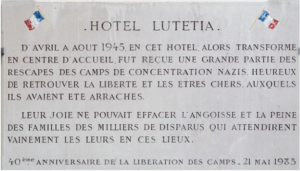
Photo taken by the students
Jacques was repatriated to France on July 16, 1945. He arrived at the “Paris Lutetia” reception center, which was in the Lutetia Hotel, where he was issued card no. 2287154. According to his medical report, Jacques was in “average” overall physical condition. He tested negative for typhus, but showed signs of “calcification in the right area of the right lung” and “small nodules under the left clavicle”. On the medical form, Jacques once again stated that he was a tailor, but gave his first name as “Jacques-Marie”.
Have later gave two different addresses.
- When he applied to be recognized as having been a political deportee, in 1954, he gave his address as 46 rue de la Folie Méricourt in the 11th district of Paris.
- When he has granted political deportee status, in 1955, he gave his address as 19 boulevard Saint Martin in the 3rd district of Paris.
Eight years after he returned from Auschwitz, Jacques finally began the process of applying to be recognized as having been a political deportee and for compensation. His application for political deportee status, submitted on November 21, 1953, states that the German records relating to the Auschwitz camp were incomplete, and that no trace could be found of his having been interned there. At that time, Jacques stated that he was “a managing director of a company”. The Seine departmental committee approved his application, although it noted that he had been “repatriated late”, and Jacques was granted political deportee status on June 2, 1955. He received the notification that he has been granted political deportee status on June 23, 1955 and deportee card n° 110116174. On September 10, 1956, he received a check for 12,000 francs from the Ministry of Veterans and Victims of War as compensation for having been deported or interned for political reasons.
We know from her death certificate that Marie died at 10:15 pm on July 16, 2009 at the Champmaillot geriatric hospital at 2 rue de Jules Violle in Dijon, in the Côte-d’Or department of France. However, we have no further information about what happened to Jacques, and our search for any potential descendants proved fruitless.
Jacques’ name is listed on the Wall of Names at the Shoah Memorial in Paris on panel no. 4, column 2, row 1.


 Français
Français Polski
Polski